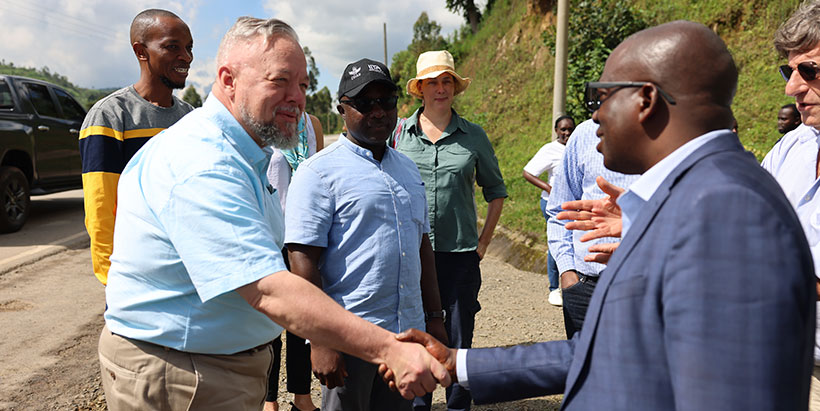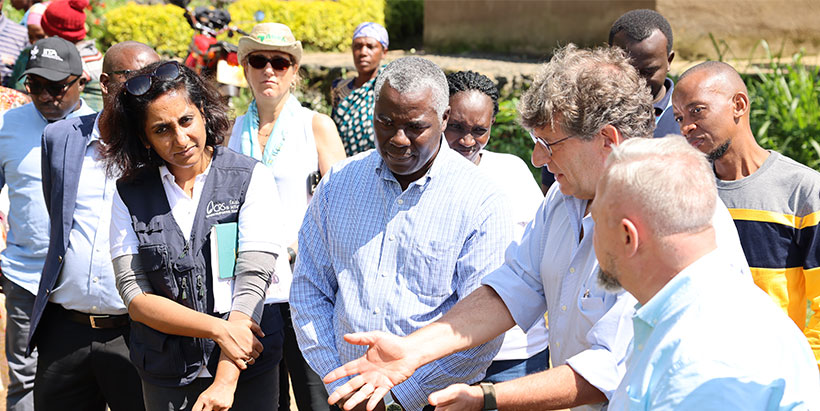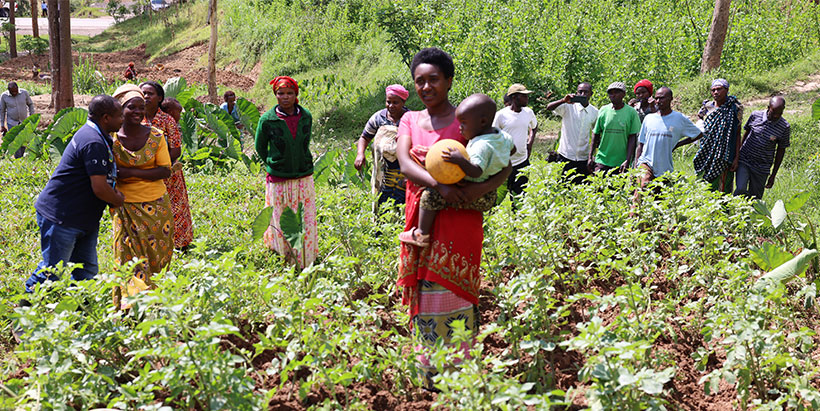It has only been six months since the USAID-funded project—Great Lakes Accelerated Innovation Delivery Initiative Rapid Delivery Hub (AID-I GLR)—settled in Burundi, the Democratic Republic of Congo, and Rwanda. AID-I GLR aims to reach 1,200,000 smallholder farmers at the household level with improved technologies and practices, to enhance productivity and consumption of nutritious food products.

Welcoming Mike Michener, the Deputy Assistant Administrator in the USAID’s Bureau for Resilience and Food Security.
The project empowers seed companies in Rwanda to create the demand for new seed varieties by enabling farmers to learn on demonstration plots and practice in their own farms using small packs. During the first agricultural season of 2023, farmers tested quality seeds of several improved varieties of orange-fleshed sweet potatoes, potatoes, high-iron beans, and maize that are more resilient to climate change.
The Deputy Assistant Administrator in the USAID’s Bureau for Resilience and Food Security, Mike Michener, visited farmers, cooperatives, and input suppliers in Rwanda’s Northern and Western Provinces. Michener had engaging interactions with farmers, seed companies, and partners at different levels. Their discussions evolved around the Village Based Advisor (VBA) model used to disseminate proven farming technologies and practices, field experiences, challenges faced, and mitigation plans for improvement.

Project stakeholders discussing the impact of some innovations being delivered by the initiative.
Kilimo General Business is among the seed companies promoting new hybrid maize seeds in the Northern Province, Musanze District. They shared their perspectives: “We have planted disease-resistant and productive maize variety in this plot. Now they are at the flowering stage. Looking at its vigor in the field, everyone who passes by our field is triggered to know the variety and wants it in their field.”
The Kilimo Business Group Manager added: “We want to change the seed systems in Rwanda because farmers in Rwanda have been lacking quality seeds for planting. This is a solution to this challenge. When farmers have quality seeds, coupled with adequate technologies and practices for planting, good yield is guaranteed.”
In Rulindo District, the Michener-led USAID team visited a plot owned by Angelique Murekatete. Murekatete has planted improved seed varieties of orange-fleshed sweet potatoes to have an individual assessment of their productivity and nutritional benefit.
She shared her sentiments with guests: “This is my first time planting this variety. At this stage, it is promising by the way it physically appears. On top of that, we have received social behavior change messages through our phones on nutrition. We intend to use the orange-fleshed sweet potatoes in our village schools, with a substitute of small fishes, vegetables, and eggs.”

Smallholder farmers seeing new seed varieties on demonstration plots.
Michener acknowledged the efforts by farmers and seed companies invested in fostering the adoption of improved farming practices through a well-structured seed system.
“Great Lakes Accelerated Innovation Delivery Initiative Rapid Delivery Hub’’ (AID-I GLR) is a multiple-stakeholder initiative that improves food and nutrition security in the region through rapid adoption at scale of proven technologies and innovation by women and men farmers. Funded by the United States Agency for International Development (USAID) and led by IITA–CGIAR, AID-I GLR is slated to reach approximately 1,200,000 farming households in Burundi, the Democratic Republic of Congo (DRC), and Rwanda.
Contributed by Ritha Bumwe



No Comments